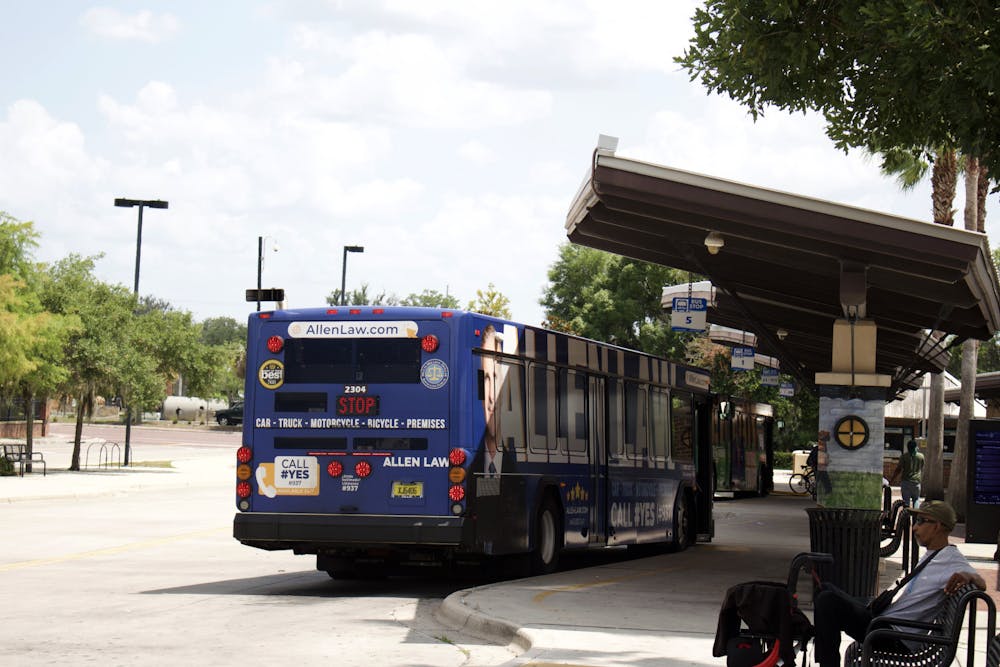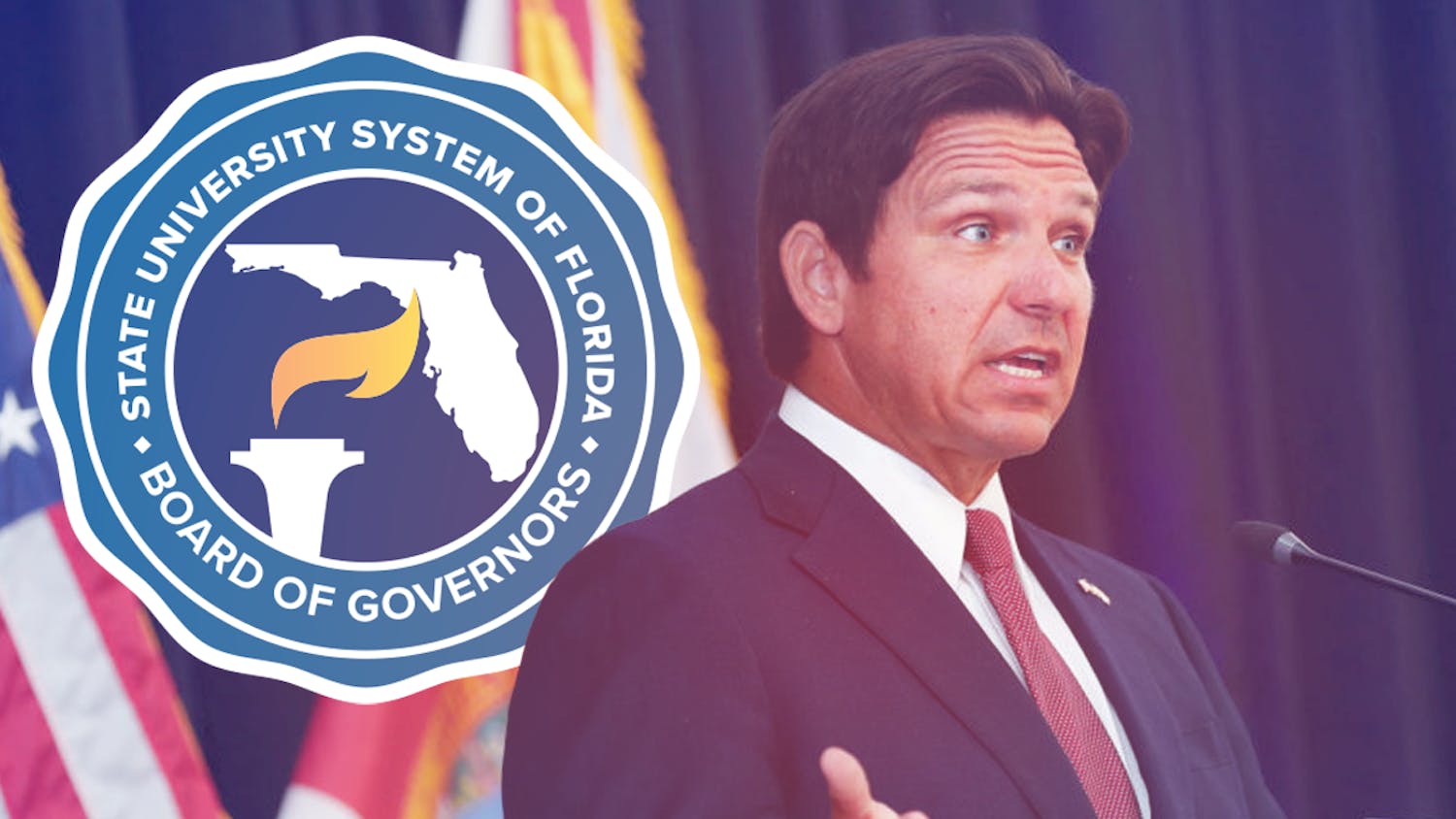The Gainesville Regional Transit System is losing roughly $2.9 million as a result of UF decreasing its funding.
The cuts were announced during a Gainesville City Commission meeting June 5.
RTS received nearly half of its funding from UF in 2024, totaling over $14 million a year. The university originally proposed funding cuts to RTS in April 2024. One year later, it announced it would focus on its Campus Connector transportation service going forward.
The loss is about 22% of its current $12.7 million operating budget, according to a June 5 press release.
The decisions left community members disappointed and worried about the new changes.
Service adjustments
RTS will add weekend-only service to Route 126, which will operate on Saturdays and Sundays from 11 a.m. to 7 p.m.
Several routes have been eliminated and combined with existing service lines. Route 16 merged into Route 17, while Route 34 was absorbed by Route 12.
Route 35’s service was split between Routes 12 and 37. Route 711 was discontinued and folded into Route 11.
Realignments, updated schedules and route combinations will affect several routes. Route 1 will follow a new alignment and schedule to serve areas previously covered by Route 46.
A removed segment from Route 3 will be served by Route 7, which includes weekend service changes.
Route 6 was also realigned. Route 12 received both a new alignment and schedule to absorb the service of Routes 34 and 35.
Route 13’s schedule and alignment were modified based on public feedback, according to the press release. Route 16 also received a new alignment and schedule after combining with Route 17.
Route 20 now includes service to Cabana Beach and operates with a modified frequency, according to the press release.
Route 23 was extended to Butler Plaza and updated with a new alignment and schedule. Route 33 also received alignment and schedule updates.
Route 75 was realigned, but its schedule remains unchanged.
Minor schedule or frequency changes were made to several other routes. Routes 5 and 8 will run at reduced frequency.
Routes 9 and 38 will no longer stop at the Reitz Union. Route 11 now includes extended night service, while Routes 15 and 26 will operate with reduced frequency, though RTS did not approve a request to fund weekend service for Route 26.
Route 37 will also experience undefined frequency adjustments, and Route 43 will return to a previous alignment with fewer scheduled trips.
No service will be provided for Routes 21, 28, 46, 76,78, 118, 122 and 127 in Summer B.
Routes 10 and 52 will continue operating without changes.
It is unknown how changing frequencies, schedules or realignments will be executed. Service adjustments will begin June 30 at the start of UF’s Summer B term.
Community reactions
Hayden Scalise, an 18-year-old incoming UF freshman attending Preview orientation, said the cuts were disappointing to hear about. With plans to start as an off-campus resident in the fall, he said busing will be his primary method of transportation.
“For them to cut that kind of feels like a big ‘Screw you,’” Scalise said.
UF talked about RTS during his Preview session at the Reitz Union but didn’t mention the incoming cuts or UF’s Campus Connector service, he said.
UF’s Campus Connector is a route-based shuttle service offered to students and staff across campus, only accessible with a mobile GATOR-ID. The connector shuttles hold 22 seats and have no standing room. Each has a maximum capacity of 40 students.
Operated by UF Transportation and Parking Services, the service runs Monday through Friday from 6:30 a.m. to 5:30 p.m.
Luke Pfeiffer, a 20-year-old UF chemistry sophomore, has utilized the bus system many times since arriving at UF. Once he moves off campus next year, he said he’ll use it even more. Some routes Pfeiffer takes are impacted by the cuts, either reducing in frequency or being completely cut.
“It makes it a lot harder for me to get to my classes in a reasonable amount of time,” Pfeiffer said.
He wonders where UF’s funding is going, if not towards RTS, he said. He felt programs that benefit students have deteriorated since he arrived at UF, noting parking is also more challenging for students to navigate.
Scott Challgren, a 50-year-old Gainesville resident, said he’s used RTS for years, including Route 46, which won’t be in service during Summer B.
Challgren was concerned route cuts may cut into people’s budgets, as they lose access to a reliable and affordable bus system, he said.
“I think it’ll make people have to scramble a little more,” Challgren said. “It helps people that can’t drive or don’t drive get around, go shopping.”
People can turn to options like Uber, but it’s much more expensive, he said. He also noted options like biking may not be as safe off-campus and in greater Gainesville.
There were 139 bicycle accidents reported in 2024 in Alachua County, according to the Florida Highway Safety and Motor Vehicles, a slight increase from the 132 reported in 2023.
RTS offers a Mobility on Demand service in East Gainesville designed for underserved populations. It offers free health screenings and door-to-door transportation to clinic visits for those who can’t easily make it to bus stops or need assistance to reach their destinations. MOD offers a morning service from 5:45 a.m. to 8:30 a.m. and afternoon and evening service from 3:45 p.m. to 7:15 p.m.
During the city commission meeting June 5, several public commenters, including students and bus drivers, urged the commission to maintain RTS funding.
Hunter Holtsworth, an RTS driver, said he’s seen how important RTS services are to the Gainesville community, even for those who don’t use them. He believes the number of people who commute to work or school is growing quicker than the city’s infrastructure, he said.
“It is not a coincidence that the highest ridership RTS ever had was in 2019,” Holtsworth said. “It was because it was the most robust and complete service we ever have offered.”
When Holtsworth was in school, he said the only reason he was able to get to class was by taking the bus. It wouldn’t be possible for him to do so with the routes the city has today, he added.
City reactions
Gainesville Mayor Harvey Ward said the partnership between the City of Gainesville and UF through RTS is one of the “best [partnerships] there is with a transit service nationwide.” He’s sad to see that partnership begin to deteriorate, he said.
The city’s budget is less flexible this year, and Ward said it's going to be challenging to navigate the cuts, especially because Gainesville only keeps financial reserves for natural disasters.
Ridership volume associated with the UF partnership was necessary for state and federal funding and matching grants supporting transit-related projects. A portion of RTS grant funding from the Federal Transit Administration and the Florida Department of Transportation is connected to ridership volume.
FTA, FDOT and UF made up 77% of RTS operational revenue in 2024.
Ward said the city is committed to retaining RTS employees despite the upcoming cuts. While some unfilled positions may be frozen, he said the city is exploring options to prevent job losses.
“I want to make sure everybody who’s employed stays employed,” Ward said.
He said the city would explore alternative funding solutions, which could include bus stop advertising and options like an independent district to manage the bus system.
Ward encouraged citizens to make their voices heard and reach out to him, commissioners and UF officials in Tigert Hall who were involved in the decision to cut RTS funding.
“Call folks at the University of Florida and say this is not acceptable,” Ward said. “If you’re a UF student, faculty or staff, that should be a call you make.”
Contact Logan McBride at lmcbride@alligator.org. Follow him on X @logandmcbride.

Logan McBride is a journalism junior and a Spring 2026 track and field reporter. In his free time, he enjoys watching TV shows or playing basketball at Southwest Rec. He is also a big football fan and will die for Dak Prescott.






